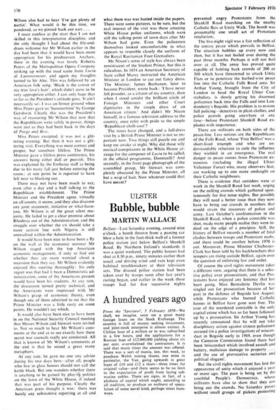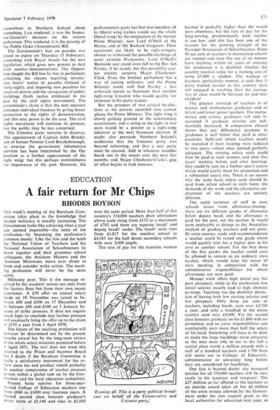ULSTER
Bubble, bubble
MARTIN WALLACE
Belfast—Last Saturday evening, around nine o'clock, a bomb thrown from a passing car blew a hole in the foot-thick wall of a former police station just below Belfast's Shankill Road. By Northern Ireland's standards it was a quiet weekend. The public houses had shut at 8.30 p.m., ninety minutes earlier than usual, and driving wind and rain kept even habitual troublemakers at their television sets. The disused police station had been taken over by troops soon after last year's rioting began, and earlier in the week these troops had for five successive nights
prevented angry Protestants from the Shankill Road marching on the nearby Catholic flats at Unity Walk. The bomb was presumably one small act of Protestant retaliation.
The five-night vigil was a fair reflection of the uneasy peace which prevails in Belfast. The situation bubbles up every now and then, but it has not boiled over during the past three months. Perhaps it will not boil over at all. The army has proved quite capable of holding back crowds of 200 or 300 which have threatened to attack Unity Flats or to penetrate the barbed-wire peace line into the Catholic Falls Road area. Sir Arthur Young, brought from the City of London to head the Royal Ulster Con- stabulary, is slowly getting his disarmed policemen back into the Falls and into Lon- donderry's Bogside. His problem is to restore full policing—detectives in plain clothes, and police patrols going anywhere at any time—before Protestant Shankill Road ex- plodes with impatience.
There are militants on both sides of the peace-line. Less serious are the Republicans of the Falls Road, whose 'Free Belfast' was a short-lived triumph and who are un- derstandably reluctant to cede the influence they wielded in an emergency. The real danger to peace comes from Protestant ex- tremists (including the illegal Ulster Volunteer Force) who, many observers fear, are working up to one more onslaught on their Catholic neighbours.
There is evidence that outsiders were at work in the Shankill Road last week, urging on the milling crowds which gathered spon- taneously for five tense nights. But possibly they will need a better issue than they now have to bring out crowds in numbers that would strain the resources of police and army. Last October's confrontation in the Shankill Road, when a police constable was shot, made many people realise they were in- deed on the edge of a precipice. Still, the history of Belfast records a number of fatal clashes between troops and Protestant mobs, and there could be another before 1970 is out. Moreover, Prime Minister Chichester- Clark has been told by his backbenchers that tempers are rising outside Belfast, again over the question of enforcing law and order.
Of course the civil rights movement takes a different view, arguing that there is a selec- tive policy over prosecutions, and that Pro- testants have enjoyed any leniency that has been going. Miss Bernadette Devlin was singled out for prosecution because of her part in the defence of Bogside last August, while Protestants who burned Catholic homes in Belfast have gone scot free. The case of the murdered constable is the only capital crime which has so far been followed up by a prosecution. Sir Arthur Young has recently announced that he will not take disciplinary action against sixteen policemen accused (in a police investigation) of miscon- duct in Bogside early in 1969, even though the Cameron Commission found there had been 'misconduct which involved assault and battery, malicious damage to property . • • and the use of provocative sectarian and political slogans'.
But the civil rights movement has lost the appearance of unity which it enjoyed a year or more ago. The pace is being set by the youthful People's Democracy, whose militants have also to show that they can bring out the crowds. No Saturday passes without small groups of pickets protesting
somewhere in Northern Ireland about something. Last weekend, it was the Inspec- tor-General's decision on the sixteen policemen. This weekend, it is the passing of the Public Order (Amendment) Bill.
The Government's ban on parades was timed to expire on Thursday (5 February), coinciding with Royal Assent for the new legislation, which gives new powers to deal with counter-demonstrations. The Opposi- tion fought the Bill line by line in parliament, criticising the clauses requiring seventy- two hours' notice of parades (instead of forty-eight), and imposing new penalties for street sit-downs and the occupation of public buildings (both tactics employed in the past by the civil rights movement). The government's claim is that the new measure enhances individual freedom by giving better protection to the rights of demonstration, and this may prove to be the case. The civil rights movement will continue its protests, but the public may be less concerned.
The Unionist party remains in disarray. The appointment of Captain John Brooke, son of former Premier. Lord Brookeborough, to oversee the government information services has been interpreted by the Op- position as a further appeasement of the right wing; but this perhaps overestimates the importance of the post. However, the
parliamentary party has lost two members of its liberal wing (cynics would say the whole liberal wing) by the resignation of the former Prime Minister, now Lord O'Neill of the Maine, and of Mr Richard Ferguson. Their successors are likely to be right-wingers, chosen to withstand the possible challenge of more extreme Protestants. Lord O'Neill's Bannside seat could even fall to the Rev [an Paisley, if he stands, but this possibility can- not entirely unnerve Major Chichester- Clark. Even the lowliest parliament has a way of taming militants; and the Prime Minister could well find Paisley a less awkward recruit to Stormont than another right-wing Unionist who would qualify for inclusion in his party caucus.
But the prospect of two critical by-elec- tions at the present unsettled time cannot please the Prime Minister. The right wing is slowly gaining ground in the constituency associations, and a swing to the right in two seats would be a pointer to a right-wing takeover at the next Stormont election. It might also persuade Northern Ireland's moderates that the Unionist party was beyond reforming, and that a new party must be created. Add in whatever troubles break out in the streets over the next few months, and Major Chichester-Clark's grip of office begins to look tenuous.



































 Previous page
Previous page